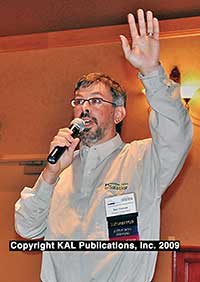Operator training is a new rule but, in theory, it's going to take all the rules and put them into one big bucket.
UST systems still leak and alarms are still ignored. You ask some station operators why their alarm is shut off. They'll say, 'Well, it was making all this noise.' Everyone has this fancy equipment but we have to make sure there's adequate training to know what it does.

A good operator knows they can better spot small problems before they get out of hand. You're mostly looking for very, very small symptoms. You have to be trained, alert, and aware of little problems that can mushroom into a large problem.
Operator training is now required by law in Colorado and Wyoming. There is no national Federal standard. It helps provide a common language between regulators and the regulated.
21,000 storage tanks have closed in Colorado. There approximately 8,000 tanks left in the state. In Colorado, 86% of sites are in compliance with release prevention requirements. Overall, only 71% of Colorado sites are in compliance with spill, overfill, and cathodic protection requirements. Wyoming is doing better; their compliance numbers are higher. They have 90% and 87%.
A Class A operator is the person having primary responsibility for on-site operation and maintenance of underground storage tank systems. He is the person who is in charge of permits, who understands the UST rules, who buys the insurance, who has the whole thing figured out. They can be back at headquarters or on-site. If you don't want to get into this business, you can hire a qualified professional and have them designated as the Class A or B operator.
The Class B operator is the person on site. They have daily responsibility for the operation and maintenance of UST systems. They're making sure everything is functioning on a daily basis.
The Class C operator is anyone on the site who might be required to understand emergency response procedures. They don't necessarily have to respond but they do have to know what to do. They have to be trained by the A and B operator or take courses.
By January 1, 2010, all operators must be identified and trained.
If a staff member leaves, they have to be replaced by a qualified, trained individual.
In Wyoming, A and B operators must be part of the company. There is no outsourcing of A and B operators. All operators must be trained by November 2009. They also have a limit of 15 UST sites per Class A operator. If you have more than 15 sites, you have to add additional Class A operators. All trained operators must notify the Wyoming DEQ that they are the designated operator.
In Colorado, to become compliant, you can pass a test by the ICC [International Code Council] that certifies your competency. You can also take a certified webinar, or take live classes. Expect the training to take a full work day. If you don't want to go through the training process, you can hire an operator.
In Wyoming, the International Code Council exam is the only option. You have to be ICC certified and you have to prove that to the state of Wyoming.
Inspectors want to get in and get out. If you're prepared for an inspection, your stuff is in order and your keys are in place, that will help a lot.
The challenge is going to be getting everyone certified and keeping everyone certified. Under current Colorado regulations, no recertification is required. If you take the ICC test, it is good for 2 years.
One person can be the A and B operator or the A, B, and C operator.
The certification information should be on-site. It does not have to be posted in the store. It can be in your binder of compliance materials.
There should be someone on-site who has class C training at all times. For every hour that an employee is physically there, someone has to be the eyes and ears of a potential problem. Employees need to know how to respond to an incident. Whether that involves going out with kitty litter or calling someone, they just need to know what to do. If you have an unmanned site, you can substitute signage for the Class C operator.
Trade magazine publishing featuring a “hometown paper” approach to industry news, events, and the people who make it all happen.